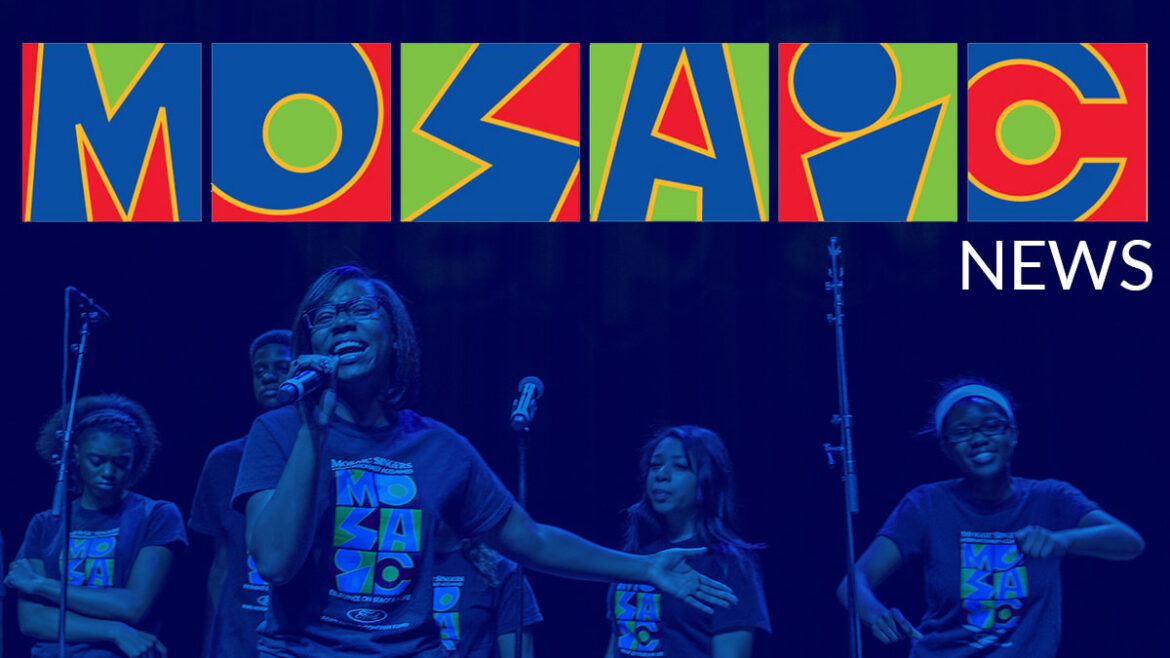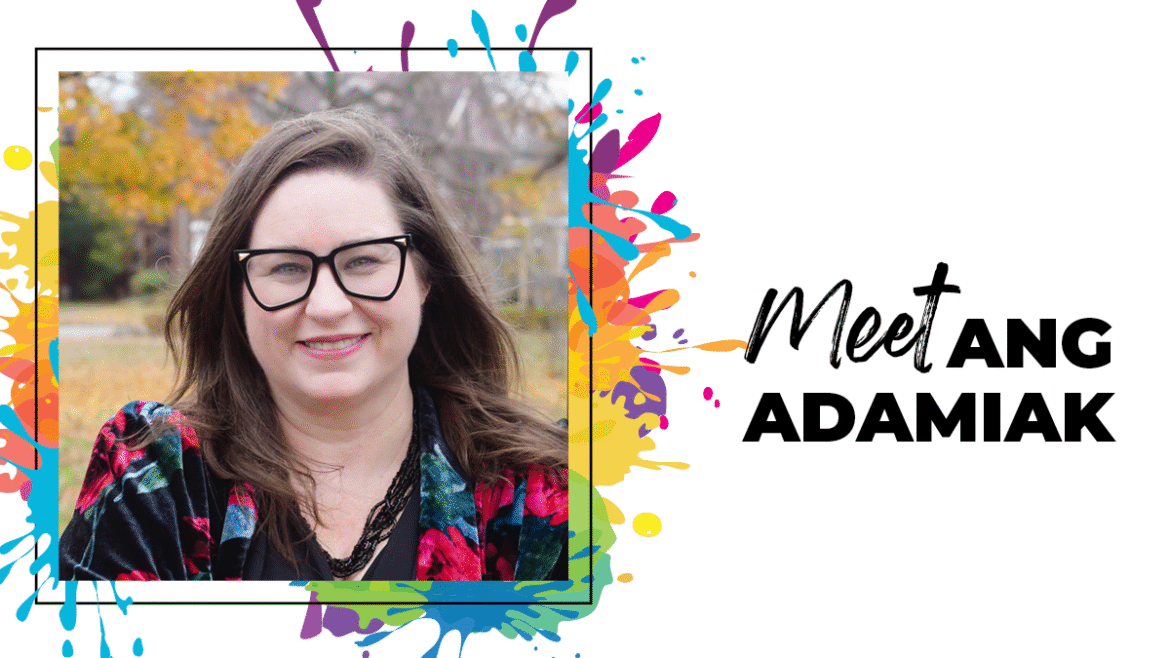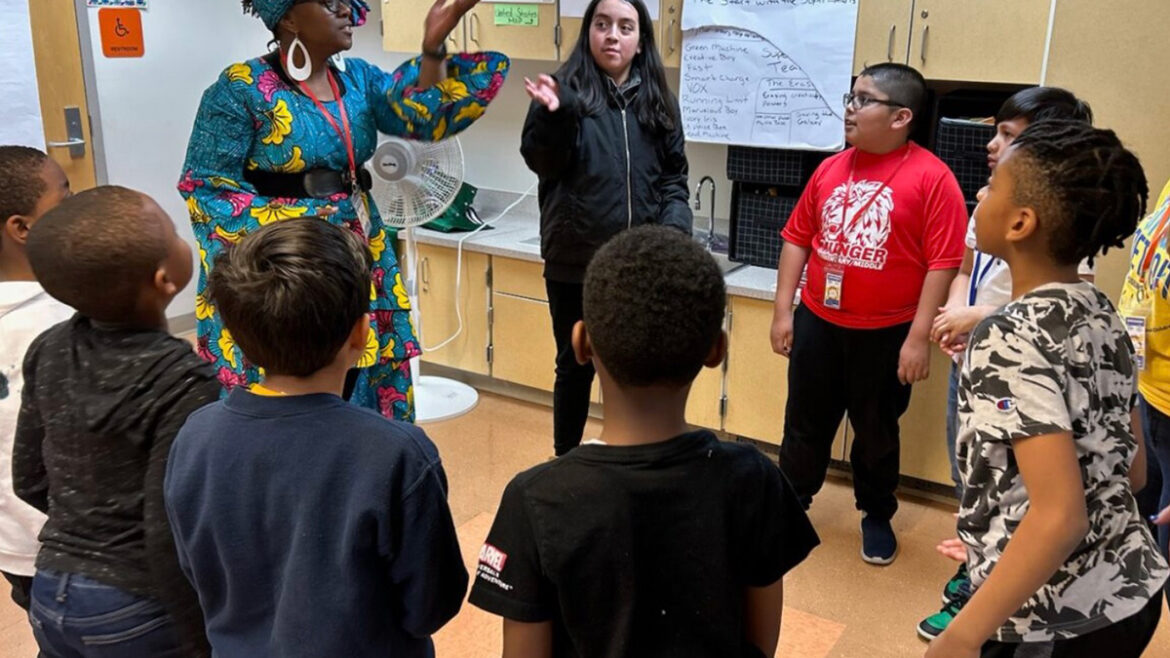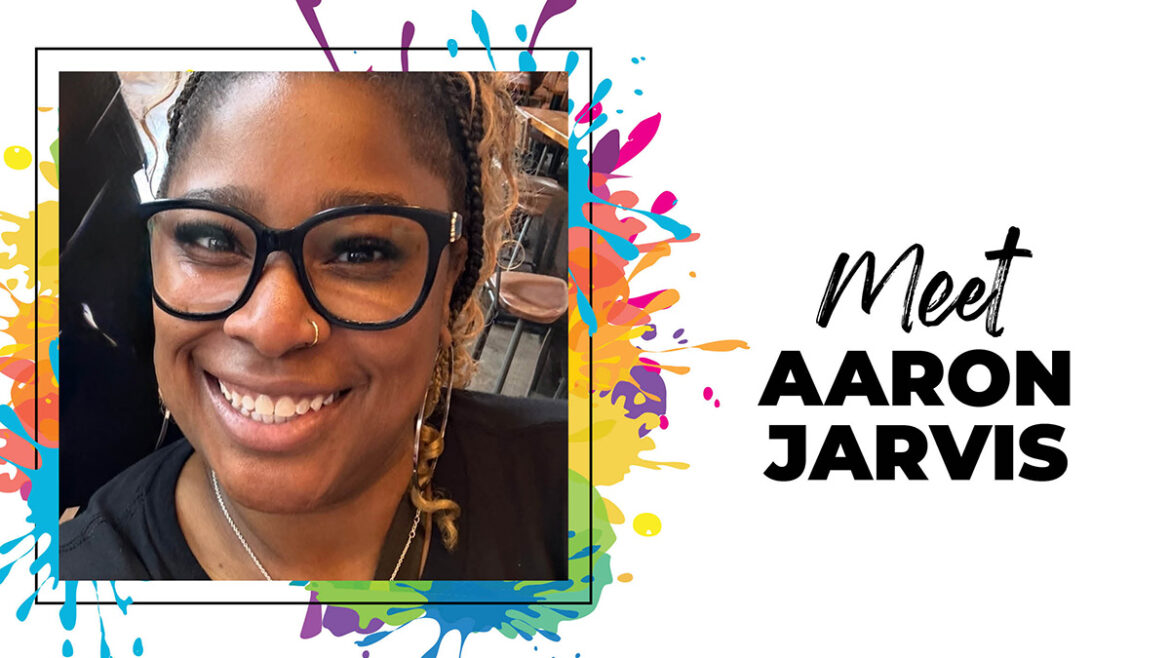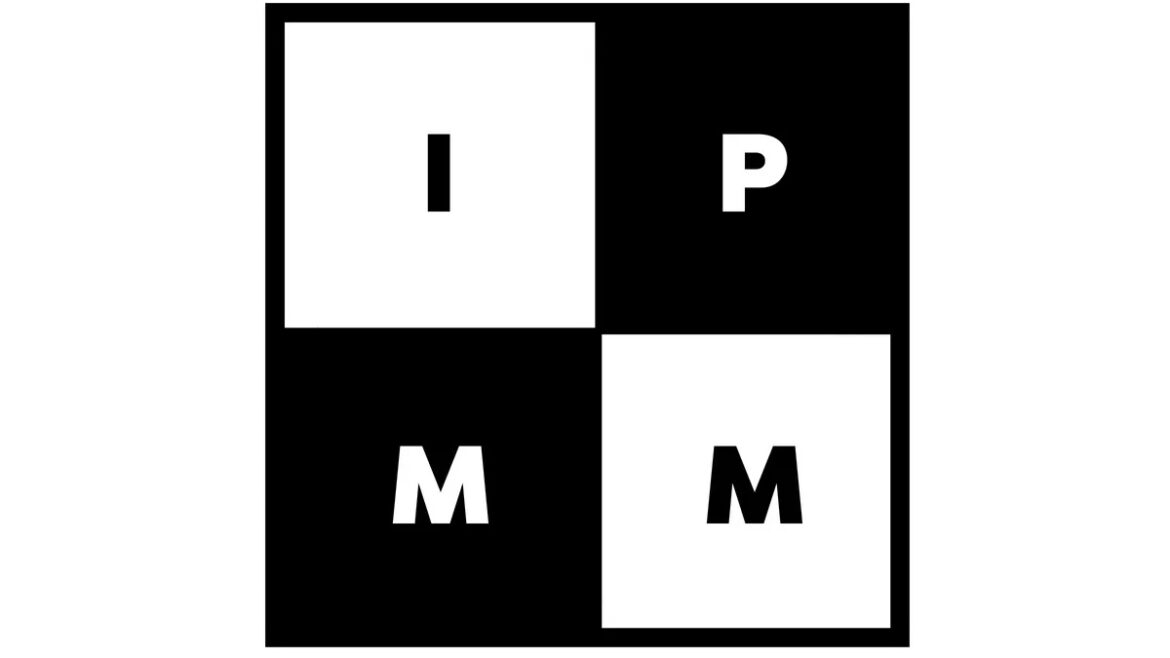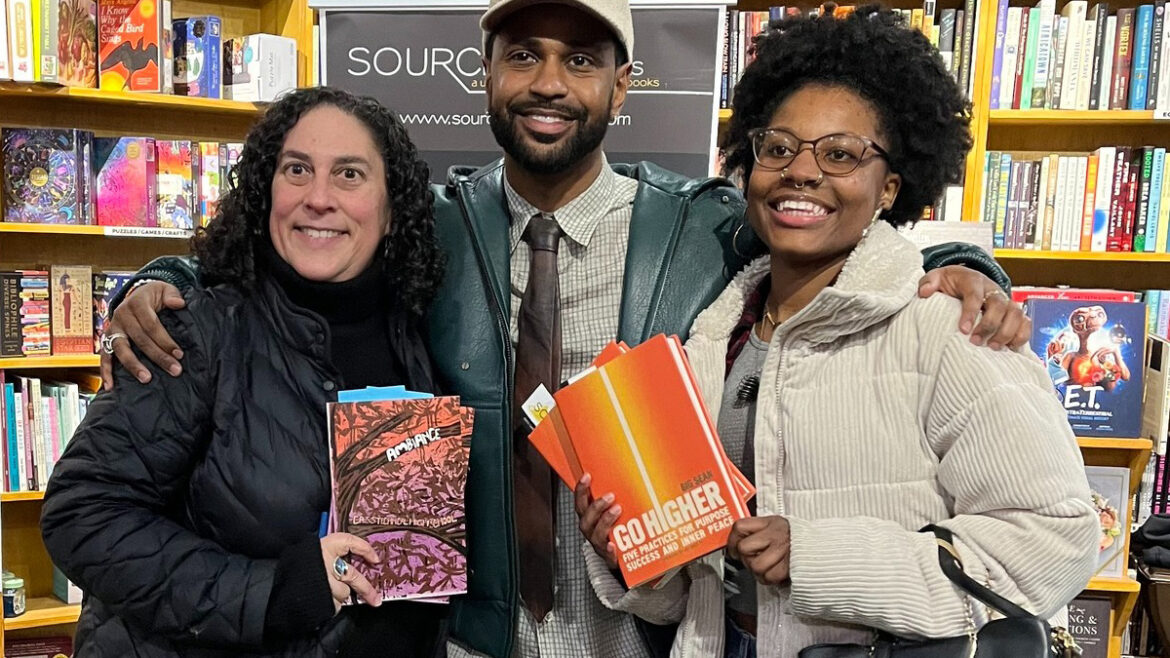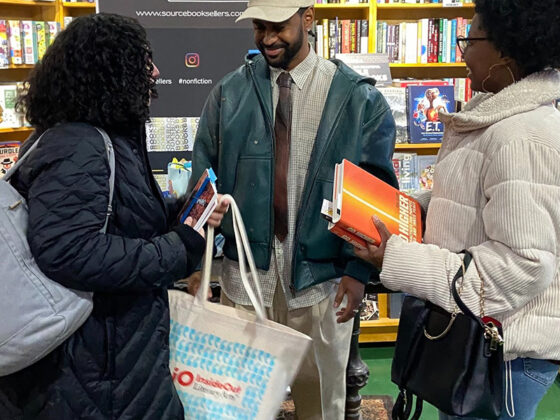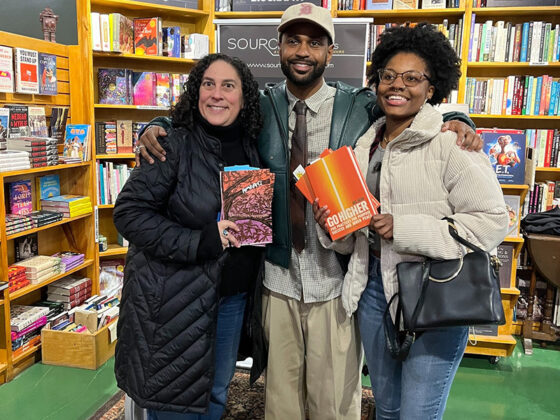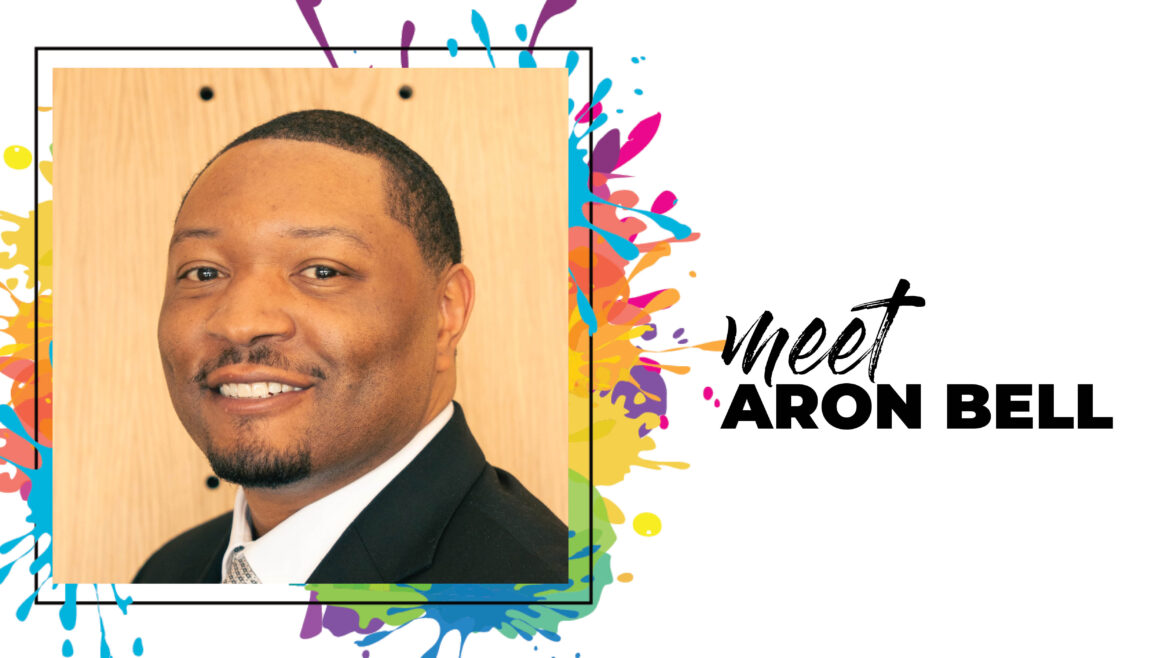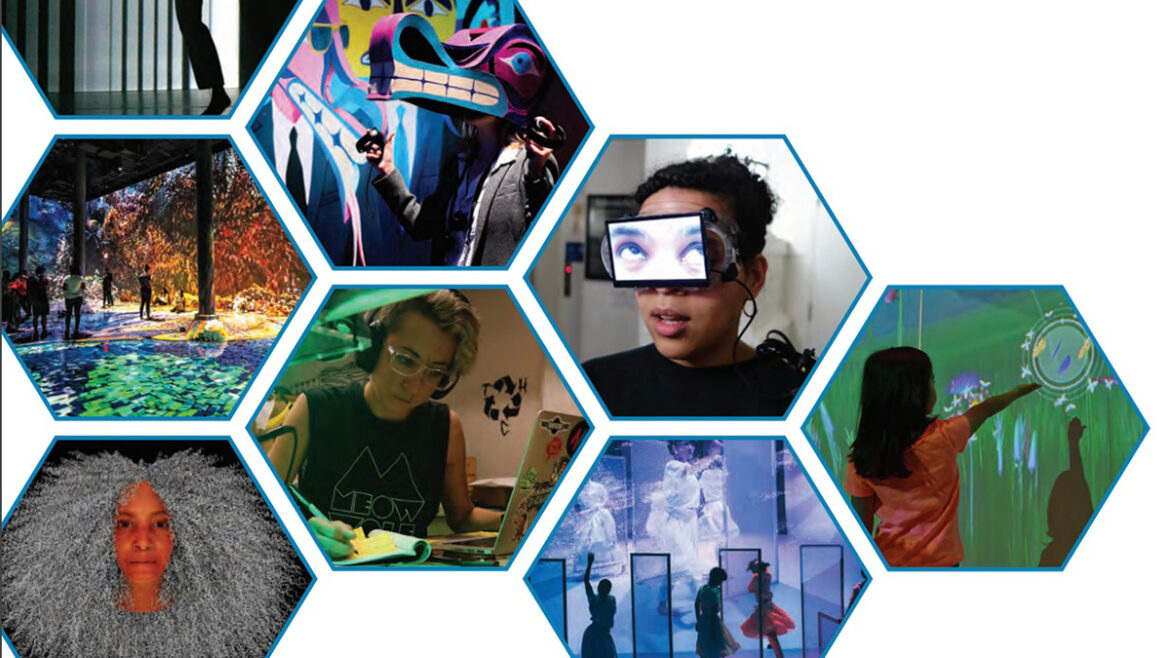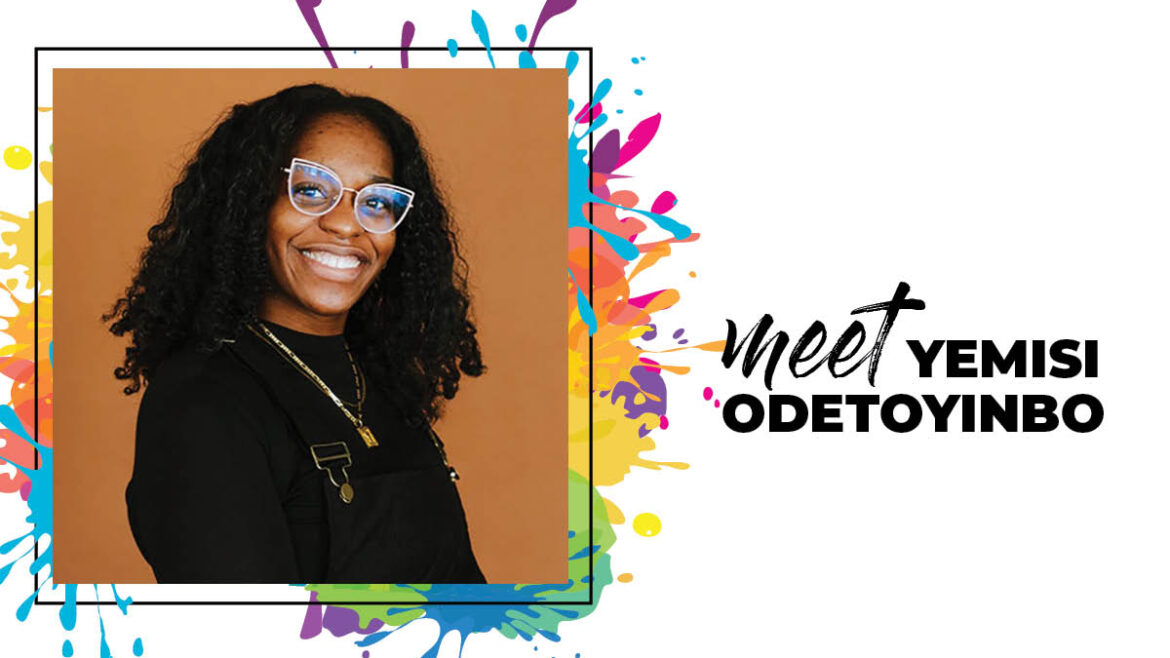We celebrated Summer Learning Week this month, and this blog post highlights key strategies for sustaining summer programs. If you chose B, you’re correct – Read more today!
We’re excited to introduce you to Ang Adamiak, our new Deputy Director! Ang was most recently Executive Director at Arts & Scraps, where she led creative programs that helped young people learn and grow through art.
At Mosaic, Ang supports finance and daily operations. She works closely with Executive & Artistic Director DeLashea Strawder and the full team to help strengthen systems that make our work with youth possible. Ang has been with us for just a few weeks and she immediately jumped all in as we work together to deepen our impact, grow partnerships, and ensure Mosaic’s long-term impact.
Getting to know Ang
Why do you invest in empowering youth through the arts?
As a youth, I was empowered through a youth development program and it changed my life, and my friend’s lives. I saw first hand the difference between my friends who had that investment in them and those that didn’t. It didn’t matter our background, the program had the power. I have since recognized that the “medium” of the youth development program is important, since it gets the student through the door, but it’s really the leadership development and the quality of the program and staff that make the difference. I want as many students as possible to have these experiences, and the best experience each of them can have. Since my first love is creativity, I have fallen into that “medium” of youth development (and loved every second of it.)
What are the values that drive you?
Community above all else. To me means 1) being willing to communicate clearly and kindly while having tough conversations. 2) Showing up for each other in the best ways we can. 3) Being open to learning from every voice in the room. 4) Driving towards balance and equity for all and realizing that’s not always going to be the easy path.
Favorite quote:
“I wake up every morning determined to both change the world and have one hell of a good time. Sometimes that makes planning the day a little difficult.” – E.B. White
If you guessed C, you’re correct! Read more below.
In a nation where the arts and education are under attack, it’s more than vital ever for young people to have opportunities to explore the arts with organizations that offer after-school learning, especially low-income and diverse populations that may not have the opportunity otherwise. A recent study from the Wallace Foundation, “Well-being and Well-becoming Through the Arts: A Picture of Mattering for Youth of Color, explores the values, goals, program design, and impact of such culture-centered, community-based youth arts (CCYA) programs.
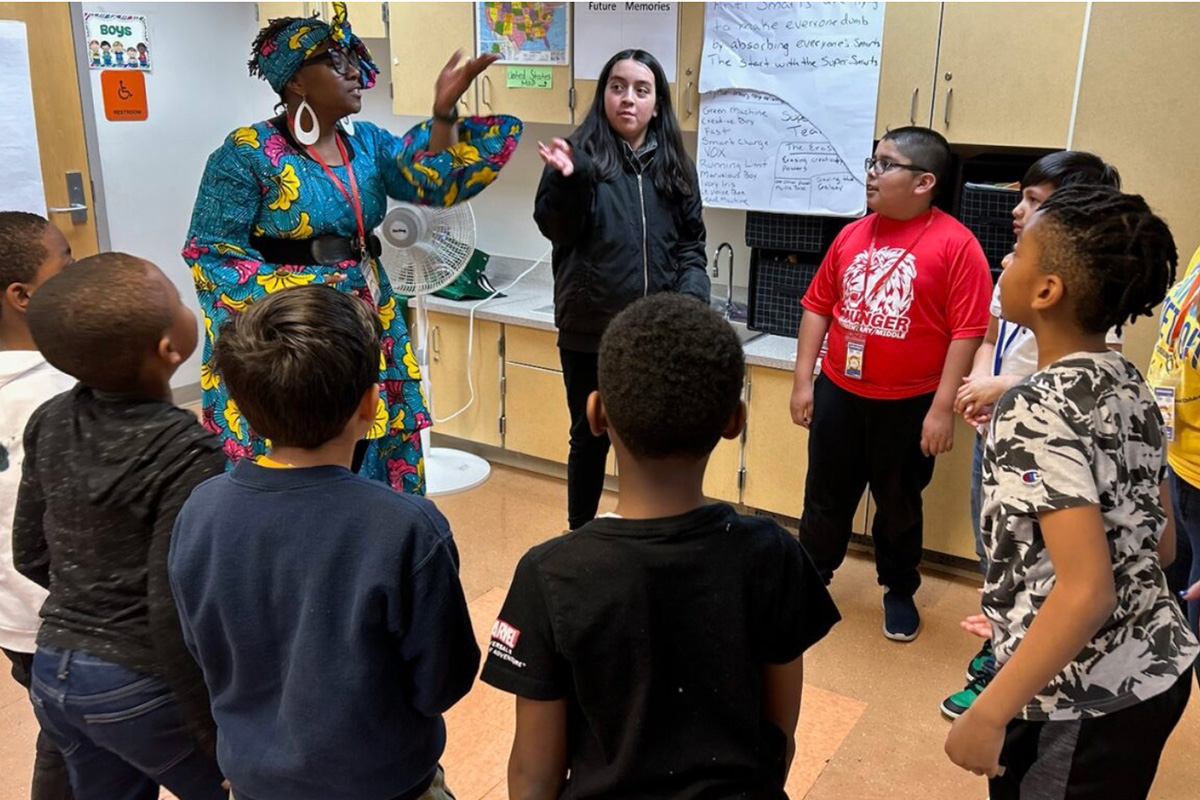
Pronouns: She, Her
Current Title/Position: HR Director, St. Anthony Healthcare Center
What drew you to Mosaic as a young person/ how’d you get involved?
I’ve always been drawn to the arts. My mom sings, all my siblings sing or spent time in theatre, or draw, I’ve spent countless hours growing up in church sitting in on rehearsals of all kinds! So it’s really been around me all my life. When I found out that Mosaic was a place for creative kiddo’s like me I was sold immediately!
Fun Fact: I was so nervous about auditioning, I hadn’t made up my mind to actually show up until the last minute. I was the last kid to be seen on the last day of auditions. Found out a couple days later that I had made it! It was meant to be!
Can you share a specific moment or experience at Mosaic that has profoundly impacted you? Is there a specific experience, lesson, or memory from your time at Mosaic that continues to influence you today?
I remember getting emotional after a final performance. We had just finished singing a great song (I don’t remember the name) and Ken acknowledged all he seniors. I was one of them. As soon as the words left his lips, the crowd roared for us! I remember getting so emotional. I instantly saw how far as a performer I had come. While I couldn’t pinpoint the exact moment I had changed, I realized that it was all about the journey (cliché, I know, lol). Here I was, a senior about to go out into the world, and honestly, I was ready! I was more social, I had friends of all different races and backgrounds. What was to come didn’t look or seem so scary. Mosaic did a great job circling us and providing real time, real life experiences and exposures to life. I will always cherish that about Mosaic and the staff.
How has Mosaic impacted your artistic, educational, or professional path? Looking back, how have the skills, mentorship, and knowledge you gained at Mosaic shown up in your personal and professional life?
Believe it or not, Mosaic IS the foundation from which I grew as a performer and as a creative in the world. Mosaic and its instructors taught me the fundamentals of music. I was taught how to be a great performer, what that meant, how to study the craft, and how to humble myself to be taught new things. I was exposed and learned how to get along with people I would have never met if I weren’t in Mosaic. Creatively I learned to push myself, believe in myself, and to be myself. I suppose these things have spilled over in my professional/work life as well. Working in the HR field, I have definitely used music as a bridge to connect with all kinds of people. This typically works in my favor since HR professionals get a bad rep. Music links us all together and it’s a great thing.
As far as my personal life?
Music is a huge part still. I still sing and help friends out with all kinds of music, art, and theatre projects. Mosaic I feel, unlocked a level in me as a kid that as an adult, I will always be thankful for.
How has your journey with Mosaic reflected the ideas of tradition, transformation, or triumph? Can you share an example of how these themes played a role in your growth as a leader, artist or individual?
I would say being in Mosaic opened my eyes as a teenager. I could actually see past my current surroundings, which meant there was more out there. I wanted to see it, needed to even, in some instances.
Mosaic taught me that Change was inevitable and the only way to survive it was to embrace it.
My best example from this? Seeing Mosaic alums when we visited campuses, seeing them come back to visit us after they graduated, seeing them on TV, or in Broadway shows, or in commercials! Most importantly, I see it in my life. I am better off after being in Mosaic; honestly and truly.
How did Mosaic prepare you for higher education or your career? In what ways did Mosaic support you in pursuing further education, or your career path?
I mentioned earlier that Mosaic did a great job pulling us into the fold and exposing us to the possibility of college and higher education. I always knew I wanted to go to college, but wasn’t sure how I would get there and when I did what I would do? After my last year with Mosaic, I was ready! I knew it was going to be a great experience. Mostly because Mosaic took us on tours to see these historic places and colleges. Mosaic literally showed us the world! So, college was a no brainer! While I didn’t major in Performing arts or music, I did end up choosing a major that would lead to a different level of creativity I was heavy into at the time, Media Production/Technology with a Minor in Journalism. I opted to go for my Masters and ended up in a Psychology program that was centered on HR Professionals. I never strayed from the arts though. I did show choir and performance choir all throughout college, and even picked up side gigs at weddings and b-day party’s with bands here and there.
What are you doing now? What; if anything, do you see as connections between creative youth development and the field you work in today? Are there any parallels or lessons from your time at Mosaic that you still apply in your current industry or work environment?
Currently, I am an HR Director for a Long and Short Term Nursing Facility. I’ve been in the HR field for 13 years now.
Mosaic really helps young people focus on being well rounded; not just good at one thing. I can honestly say that Mosaic made me a much better, well rounded young adult entering the world after high school. I’ve tried to keep it going by remaining open to life’s challenges and obstacles, and understanding that being a well-rounded individual having the ability to stand up straight in the world was always the goal. Best life lesson ever.
How would you describe Mosaic in a few words or a short phrase? Please finish this sentence: “Mosaic is…”
Mosaic is the best thing that could have ever happened to me as a teenager, and I am forever grateful to have experienced it to the fullest.
If you guessed D, you’re correct! Learn more about the data-driven case for arts education and its role in fostering entrepreneurship.
If you guessed C, you’re correct!
What drew you to Mosaic as a young person/ how’d you get involved?
Mosaic provided a high-level creative outlet and opportunity that I wasn’t receiving at my high school. At the time, I was coming from a strong musical theatre background at a performing arts-focused middle school, while my high school had little to no music programs. A classmate who was already a member suggested I audition for the Mosaic Singers, and I took him up on that offer.
Can you share a specific moment or experience at Mosaic that has profoundly impacted you? Is there a specific experience, lesson, or memory from your time at Mosaic that continues to influence you today?
During my years in the company as a Mosaic Singer, we were tasked with preparing showcases that typically ran for three nights. Performing a 90-minute choral production alongside 60+ other young artists taught me the importance of ensemble work, rehearsal discipline, accountability, memorization, musical comprehension, performance preparation, and time management. I’ve carried many of those skills with me into various creative and professional environments.
How has Mosaic impacted your artistic, educational, or professional path?Looking back, how have the skills, mentorship, and knowledge you gained at Mosaic shown up in your personal and professional life?
The mantra ‘Only the best, nothing less’ has been a personal creed since my time with Mosaic. As an ensemble, we recited it often because it reminded us that our actions needed to rise to the occasion. I pride myself on being an ambitious critical thinker with a strong work ethic, and that shows in both my creative and professional life. Whether I’m writing music or crafting marketing copy, I hold myself to a high standard. Looking back, I balanced being a full-time high school student, a part-time after-school program counselor, and a young artist. It wasn’t easy, but I’m proud of myself, and I couldn’t have done it without the support of my family at home and my Mosaic family.
How has your journey with Mosaic reflected the ideas of tradition, transformation, or triumph? Can you share an example of how these themes played a role in your growth as a leader, artist or individual?
I was a shy teenager, still figuring out what it meant to be my most authentic self. I had different interests than many of the kids at school and in my neighborhood, but I didn’t yet know how to express my emotions in constructive ways. Joining Mosaic gave me the space to explore my character and personality within a community of like-minded individuals. I developed a deeper understanding of friendship and became more aware of how my words and actions affect those around me. Witnessing so many forms of expression from kids of both similar and different cultural backgrounds taught me that our uniqueness is a strength. I learned that it’s okay to be myself, and make mistakes. It does not define who I am.
How did Mosaic prepare you for higher education or your career? In what ways did Mosaic support you in pursuing further education, or your career path?
The opportunity to join the company during the college tour opened my eyes to new possibilities. Visiting college campuses in different states and cities I had never been to before introduced me to options I likely wouldn’t have considered for my next step after high school graduation.
What are you doing now? What; if anything, do you see as connections between creative youth development and the field you work in today?
In my current role as Marketing Content Producer at Visit Detroit, I develop website and long-form YouTube content on behalf of the visitor and convention bureau. I feel deeply connected to Detroit and its creative community. The relationships I’ve built over the years through collaborations with artists, musicians, thespians, photographers, and videographers have proven to be invaluable. I’m able to hire local creatives to execute marketing projects that, in turn, attract visitors and major events to our region, helping drive economic growth.
Are there any parallels or lessons from your time at Mosaic that you still apply in your current industry or work environment?
Time management and accountability, for sure. No matter what’s happening in my personal life, I’m responsible for completing my daily tasks and meeting monthly goals, just like I was responsible for memorizing music and showing up to Mosaic performances on time, focused and prepared to perform at a high level. Teamwork is vital to everyone’s success.
How would you describe Mosaic in a few words or a short phrase? Please finish this sentence: “Mosaic is…”
Mosaic is a community of dedicated, creative individuals who unite to uplift the transformative power of the arts.
Is there anything else you’d like to share?
I am forever grateful for my time as a Mosaic Singer. Contributing to the legacy of such an empowering youth development organization by simply doing what I love will always be both an honor and a privilege. Please continue to provide a safe space for the youth of Detroit to share their stories and express themselves authentically.
If you guessed B, you’re correct! Learn more in the report!
In this report, Tech as Art: Supporting Artists Who Use Technology as a Creative Medium, presents findings from a field scan commissioned in 2019 by the National Endowment for the Arts in partnership with the Ford Foundation and the Knight Foundation. The purpose of the scan was to more fully understand how artists are incorporating digital technologies in their creative work and to learn more about the current and prospective sources of support for these artistic practices. Funders reading the report then can make smarter decisions on how to enhance support for this field. The research is grounded in literature reviews, interviews, and group discussions with artists and practitioners across the United States.”
Yemisi Odetoyinbo (she/her)
Therapist, Birthworker, Yoga Instructor, Occasional Stage Manager
What drew you to Mosaic as a young person/ how’d you get involved?
My sister was in Mosaic and it seemed really fun.
Can you share a specific moment or experience at Mosaic that has profoundly impacted you? Is there a specific experience, lesson, or memory from your time at Mosaic that continues to influence you today?
I specifically remember the set and lighting for the show A City in the Strait. I remember the show being such a unique experience.
The things that stand out the most to me when I think about my experience were the amazing friendships and connections. Many of the people I met in Mosaic, I still have very close relationships with.
How has Mosaic impacted your artistic, educational, or professional path?Looking back, how have the skills, mentorship, and knowledge you gained at Mosaic shown up in your personal and professional life?
Mosaic inspired me to pursue theatre design and production in college. Reflecting on my journey, I realize that while I gained valuable skills and technical knowledge, it was the friendships and mentorships that truly shaped my experience, evolving into a sense of family.
How has your journey with Mosaic reflected the ideas of tradition, transformation, or triumph? Can you share an example of how these themes played a role in your growth as a leader, artist or individual?
Transformation comes to mind for me. I have always been more of an introverted person and I think that was true for many people who were in the technical program. Mosaic helped me to speak up about my artistic and creative ideas and helped me to feel more comfortable speaking up.
How did Mosaic prepare you for higher education or your career? In what ways did Mosaic support you in pursuing further education, or your career path? What are you doing now?
Mosaic has played a pivotal role in shaping the artist and professional I continue aspire to be. With my diverse interests, the knowledge and skills I gained there made me realize that I don’t have to limit myself to a single path. It was inspiring to witness others in the company transition seamlessly between acting, singing, and technical roles, showcasing the beauty of a multifaceted journey. Likewise, the tech program exposed us to a wide array of disciplines, from lighting and sound to carpentry, enriching my experience and broadening my horizons.
Now I am a therapist, a birthworker, a yoga instructor, and continue to work in theatre production in the city.
What; if anything, do you see as connections between creative youth development and the field you work in today? Are there any parallels or lessons from your time at Mosaic that you still apply in your current industry or work environment?
In my work as a therapist, I operate on the belief that individuals thrive when they feel supported and validated in a safe environment. This nurturing space encourages people to share their true selves—emotionally and creatively. Mosaic provided that essential environment for me and countless other young artists, fostering our growth and self-expression.
How would you describe Mosaic in a few words or a short phrase? Please finish this sentence: “Mosaic is…”
A creative holding space.
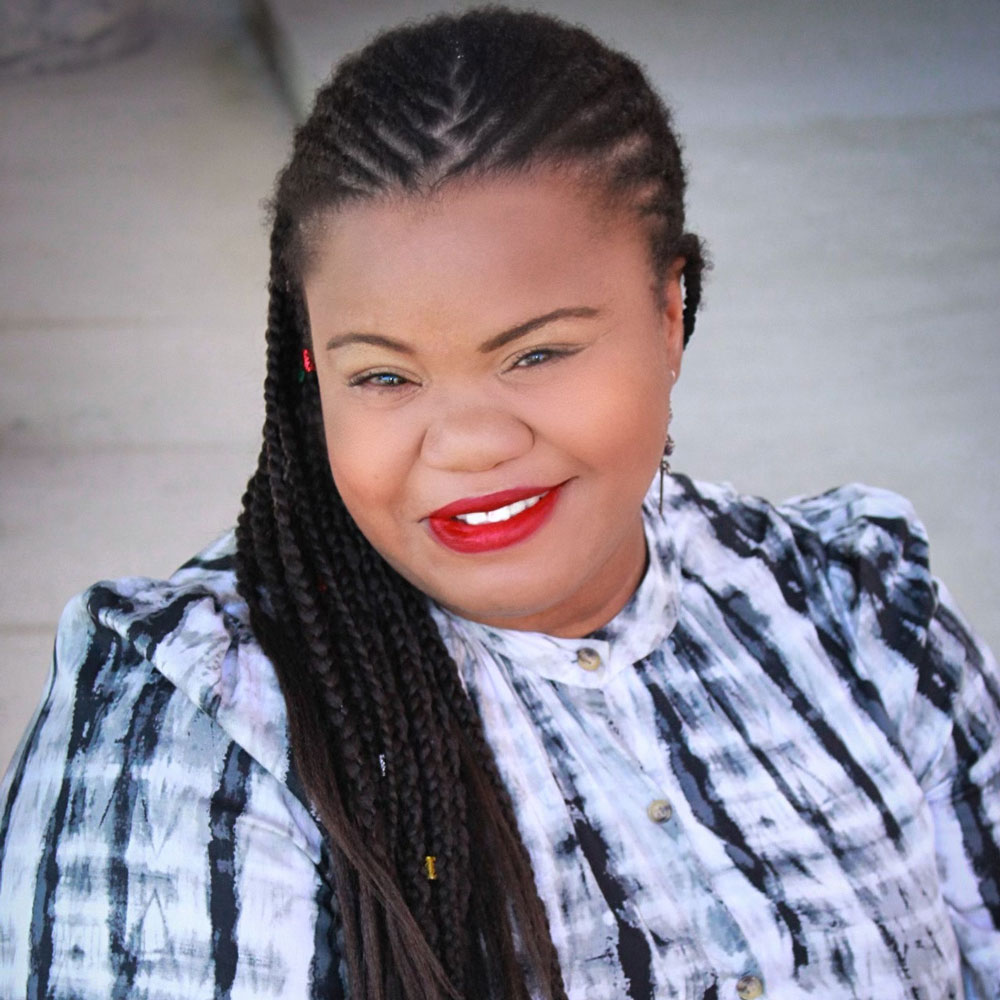 We are delighted to announce the 2025 cohort of the Eugene A. Miller Fellowship Program — four distinguished leaders who determined that this was their year to take time away from their organizations to rest, reflect, and recharge. Please read on to learn more about DeLashea Strawder, Lionel Bradford, Nicole Wilson, and Willie Bell, each of whom has demonstrated extraordinary leadership in their fields.We deeply recognize the significance of answering the call to rest amidst such turbulent and uncertain times. However, as detailed in our most recent biennial report, Miller Fellows have taught us that working to exhaustion and burnout is itself an injustice. As we celebrate this year’s cohort, we also ask our funding peers and our broader community to support them and their organizations as they navigate the coming months while honoring the call to rest.On behalf of the McGregor Fund Board of Trustees and staff, I’d like to extend congratulations to this year’s Miller Fellows, thank them for all they have given to our community, and wish them well as they prepare for their well-earned sabbaticals.
We are delighted to announce the 2025 cohort of the Eugene A. Miller Fellowship Program — four distinguished leaders who determined that this was their year to take time away from their organizations to rest, reflect, and recharge. Please read on to learn more about DeLashea Strawder, Lionel Bradford, Nicole Wilson, and Willie Bell, each of whom has demonstrated extraordinary leadership in their fields.We deeply recognize the significance of answering the call to rest amidst such turbulent and uncertain times. However, as detailed in our most recent biennial report, Miller Fellows have taught us that working to exhaustion and burnout is itself an injustice. As we celebrate this year’s cohort, we also ask our funding peers and our broader community to support them and their organizations as they navigate the coming months while honoring the call to rest.On behalf of the McGregor Fund Board of Trustees and staff, I’d like to extend congratulations to this year’s Miller Fellows, thank them for all they have given to our community, and wish them well as they prepare for their well-earned sabbaticals.


